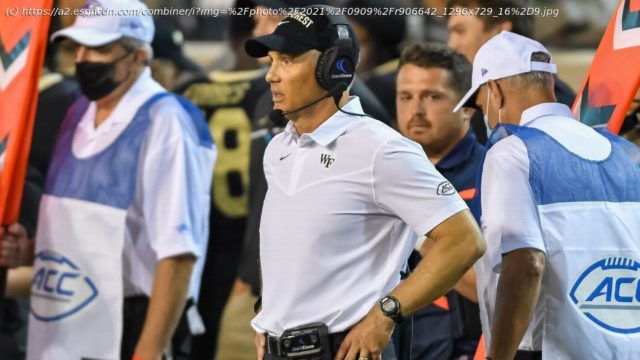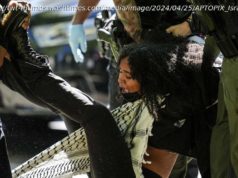From the first game played after 9/11 to an 1,800-mile walk, coaches and former players recall how 9/11 influenced them 20 years ago and now.
Twenty years after 9/11 shook the nation, its aftershocks are still being felt. In college football — a sport that had just launched its season when the terrorist attacks brought it to an abrupt halt — coaches and former players say they continue to be shaped by it both on and off the field. From the first game back between South Carolina and Mississippi State to a coach’s true calling card to paying tribute to those lost, here are five stories that recall the lasting effect of the events of Sept.11,2001. Jump to: Charlie Skalaski’s path back to football Life off the field Remembering South Carolina vs. Mississippi State A larger appreciation for life An 1,800-mile walk of advocacy GAINESVILLE, Fla. — Charlie Skalaski sat down inside the University of Florida football staff room one morning in mid-July and considered a time two decades earlier when he would have been 1,000 miles away in a posh sixth-floor office overlooking Central Park. Life then was comfortable and busy, so busy he didn’t stop and consider whether any of it — he was working as a senior executive at a large corporation and doing quite well for himself — was what he really wanted. He never would have come back here — back to his alma mater, back to football, back to what he said has always been his life’s purpose — if not for that tragic day 20 years ago when he was working in New York City and watched as the World Trade Center fell. This second lease on life, he said, never would have happened. „I don’t think I had the guts to take myself out of it,“ he said. „I was a coward.“ Now 64 years old and the director of player personnel at Florida, he can still hear the panic in his wife’s voice when she called to check on him that day. He had plans to go downtown, which meant he’d take one of two subway lines — one that would let out two blocks from Wall Street or one that emptied at the World Trade Center. He never got on the subway. His assistant called him back to the office just as he was about to head down to the platform. She told him a plane had hit one of the Twin Towers, but they assumed it was an accident, a small prop plane that had lost control. But when they realized it was a commercial jet, the gravity started to sink in. Skalaski called security to shut down the building. The first tower fell. It was traumatic, he said. His company brought in psychologists to counsel employees. They recommended letting everyone go home early for the next few months to spend more time with their families. So for the first time in a long time, Skalaski would see his 10-year-old son play football. He went out to practice in their neighborhood of Ridgewood, New Jersey, one day when a woman approached him and made small talk. She asked who his son was and if Skalaski had ever played football. He had, he said. He was a defensive back at Florida in the 1970s and a graduate assistant under then-assistant coaches Mike Shanahan and Steve Spurrier. The next day, he received an unexpected call. „Hey, Charlie,“ the caller said. „This is Chuck Johnson, coach at Ridgewood High School. Would you consider helping us out?“ More than 10 people in Ridgewood had died in the attack on the World Trade Center — two of them were volunteer coaches. Skalaski started out as the junior varsity defensive coordinator. They played on Thursday and Saturday nights. Each week, he’d invite players over to the house for dinner. Six weeks in, he looked around and asked himself, „What have I done?“ All those years he had spent climbing the ladder — when this was the life he had wanted all along. „I get emotional talking about it,“ he said, „but this is what I was meant to do all along — this is what God put me on Earth to do. So much of my life I’m a success in the world’s eyes, flying private jets. But I’m miserable.“ A religious man, he looks back on 9/11 as a wake-up call. He was scared to make such a drastic life change, but he remembered a time a decade earlier when he put his other dream of working in the FBI on hold, eventually aging out of the ability to enter the training courses. He was determined not to let that happen again. The following summer, he used his vacation time to coach two-a-days at Ridgewood High. He took a severance package to leave his job that October and told his wife he had a new plan: get into coaching. She thought he was having a midlife crisis but played along, telling him he had three months to find a job. After hundreds of unreturned letters and phone calls, Skalaski found a last-minute opportunity at Liberty. With a straight face, he had to tell his wife that he wasn’t going to accept the six-figure offers he had for sales positions. He was going to Lynchburg, Virginia, to coach tight ends for $40,000 a year — a far cry from what he was making before. None of this happens without her support and understanding, he said. He doesn’t spend 10 years at Liberty. He doesn’t get hired as assistant to the head coach with the Jacksonville Jaguars in the NFL. He doesn’t go to Eastern Kentucky and Charlotte and get a call from Dan Mullen to return to his alma mater, where he’s now part of a vast personnel department that last year signed the No.10-ranked class in college football, according to ESPN. Looking back, he sees the signs pushing him back to football. Like when he committed to Liberty and his house sold in less than 24 hours. Or when he was driving to LaGuardia Airport in New York to interview for the job, second-guessing himself the entire way, and Lee Ann Womack’s „I Hope You Dance“ came on the radio. „Never settle for the path of least resistance; Livin‘ might mean takin‘ chances, but they’re worth takin‘.“ Tears rolled down his face. This is what he was always meant to do, he said. He just needed to stop and find a way back to Gainesville, back to the game he loves. — Alex Scarborough Charlton Warren had just made first lieutenant and was at Robins Air Force Base in Warner Robins, Georgia, leading a program to reconfigure the cockpits of C-130 cargo aircraft all over the world. Once a teenager who had never been on an airplane, it was almost a world away from where he was when he took his official visit to the Air Force, a visit that ended up changing his life, eventually leading him to Indiana, where he’s now the defensive coordinator.
Start
United States
USA — Science How 9/11 continues to resonate throughout college football 20 years later






